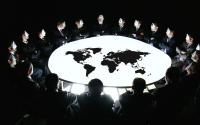24 September 2004The Independent
Large areas of the country are in rebel hands, American forces are attacked every day and Ken Bigley is facing imminent execution, but for George Bush and Iyad Allawi yesterday these were but minor obstacles on Iraq's certain path to freedom and democracy.
For four hours, the Iraqi interim Prime Minister was front and centre of the US President's re-election campaign. He was given the great ceremonial stages of Capitol Hill and the White House to proclaim Mr Bush's constant simple message to voters: whatever the appearance on the ground, Iraq is making steady progress and withdrawal now would have disastrous consequences.
Perfectly on cue, the President vowed that the US would not, and could not, leave Iraq until the job was done. Nor could there be any negotiating with the militants who had abducted Mr Bigley.
The forceful message from Washington contrasted with the increasingly desperate pleas for mercy yesterday from Mr Bigley's family in Liverpool. In a televised message to his captors, Mr Bigley's mother, Elizabeth, 86, begged for her son to be sent home alive. Shortly after, the anxiety of waiting for news of her son appeared to take its toll. She collapsed and was taken to hospital, where her condition was described as stable before she was released.
Earlier in the day, Tony Blair had telephoned the family for the second time this week. Supported by her sons Philip, 49, and Stan, 67, she said: "Would you please help my son? He is only a working man who wants to support his family. Please show mercy."
The 62-year-old engineer's Thai wife, Sombat, also pleaded for his release. "We have been married for seven years and I love him very much ... I desperately want to be reunited with my husband," she said. "I plead for your mercy now, and beg that you release Ken so that I may be with him again."
Mr Bush said he was "disgusted" by the beheading this week of the two Americans who were kidnapped with Mr Bigley, but, he stressed, "I'm not going to yield." Iraq was part of the war on terror, he said, and if America failed there its own security would be imperilled. Undefeated, the insurgents could "plot and plan attacks elsewhere". This was also Mr Allawi's line; indeed almost his every utterance could have been delivered by the President. Yesterday showed how closely the two men's fortunes are bound together. Mr Allawi's success is vital to Mr Bush's re-election campaign, but the Iraqi must rely on the US military for his very survival.
Even in style the two men resembled each other. Mr Bush was his habitual self, truculent, unyielding and unshakeable in the rightness of his cause and his judgement. The stocky Mr Allawi, with his crisp, slightly guttural English, projected an almost equal self-confidence.
The elections scheduled for January would go ahead as planned, he declared. "They won't be perfect," he conceded, "but they will take place and they will be free and fair." Of Iraq's 18 provinces "14 or 15" were utterly safe, he said, glossing over the major towns in insurgent hands.
Mr Allawi's appearance came at a pivotal moment, when Iraq has turned into the campaign's all-consuming issue, with Mr Bush under withering daily attack from his Democratic opponent, John Kerry, for his alleged mishandling of the crisis.
Loudly applauded by Republicans, Mr Allawi delivered what he called "three messages", which are central to Mr Bush's own re-election bid: the Prime Minister and the interim government in Baghdad are succeeding, America is to be thanked for its assistance in Iraq and the world is better off without Saddam Hussein.
He too reiterated that no deals could be made with those holding Mr Bigley: "When governments negotiate with terrorists, everyone in the free world suffers." Abu Musab al-Zarqawi (believed to be the leader of the group holding the Briton) was not alone. "There are others like him", watching for the first sign of weakness, Mr Allawi said. Only once did a crack appear in the wall of unity. Under questioning, Mr Bush implied that he would send more troops to Iraq, as apparently requested by General John Abizaid, head of US Central Command, which runs the Iraq campaign. Mr Allawi indicated he opposed such reinforcements, saying the job should be done by the Iraqi forces now being trained.
Campaigning in Ohio, Mr Kerry accused Mr Bush of lying about the true state of Iraq. "America needs leadership that tells the truth," he said. It was "a disgrace" that the Defence Secretary, Donald Rumsfeld, had not come clean about what was happening and a disgrace that the President did not hold anyone responsible.
The President had failed to provide security for Iraq, Mr Kerry said, citing the recent CIA assessment that the country could be on the brink of civil war.
The assumption here is that as soon as the US elections are out of the way, a second Bush administration would launch a major offensive against insurgent strongholds in Iraq to clear the path for elections there.






